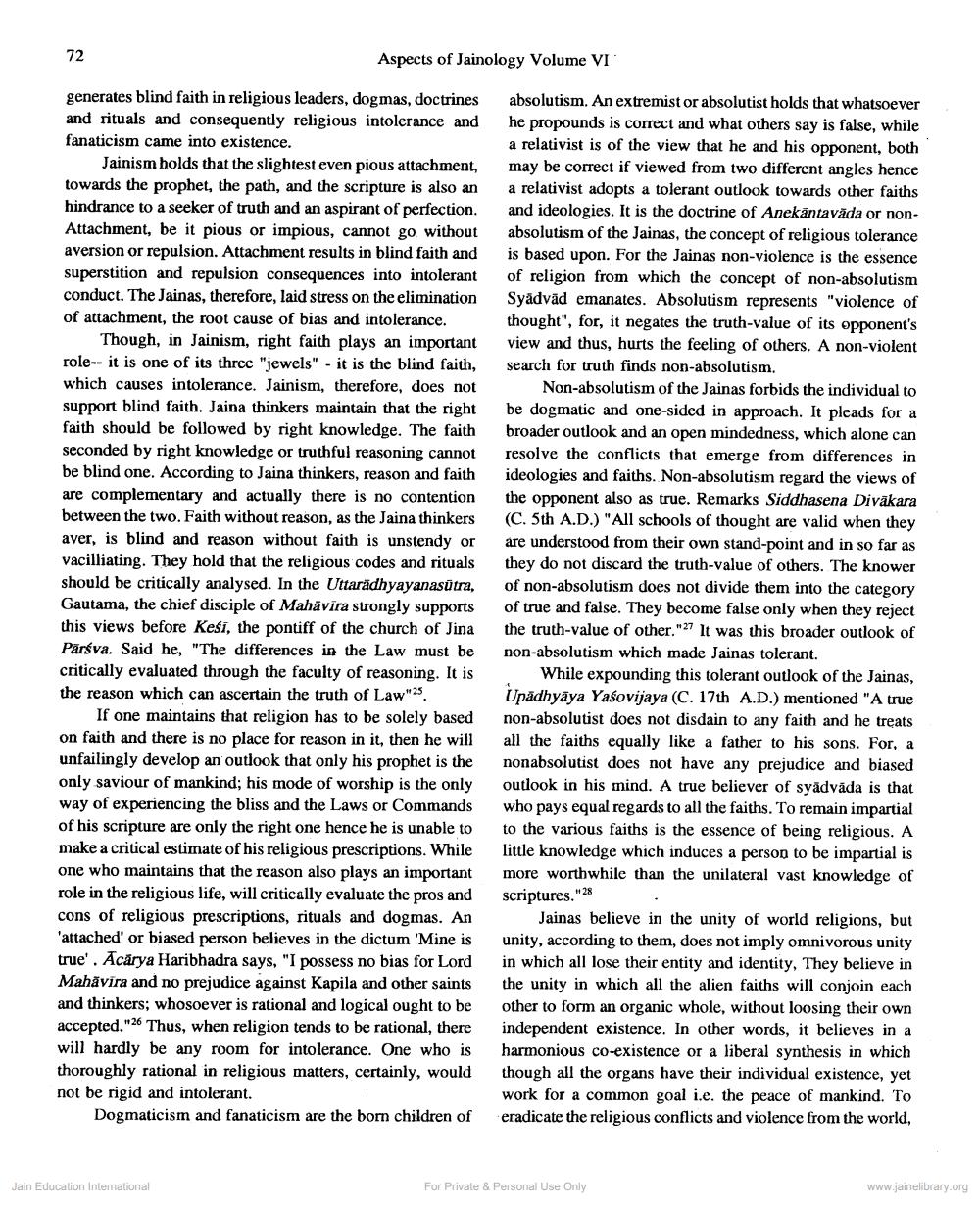Book Title: Jaina Concept Of Peace Author(s): Sagarmal Jain Publisher: Z_Jaina_Literature_and_Philosophy_a_Critical_Approach_001936_HR.pdf View full book textPage 7
________________ 72 Aspects of Jainology Volume VI generates blind faith in religious leaders, dogmas, doctrines and rituals and consequently religious intolerance and fanaticism came into existence. Jainism holds that the slightest even pious attachment, towards the prophet, the path, and the scripture is also an hindrance to a seeker of truth and an aspirant of perfection. Attachment, be it pious or impious, cannot go without aversion or repulsion. Attachment results in blind faith and superstition and repulsion consequences into intolerant conduct. The Jainas, therefore, laid stress on the elimination of attachment, the root cause of bias and intolerance. Though, in Jainism, right faith plays an important role-- it is one of its three "jewels" - it is the blind faith, which causes intolerance. Jainism, therefore, does not support blind faith. Jaina thinkers maintain that the right faith should be followed by right knowledge. The faith seconded by right knowledge or truthful reasoning cannot be blind one. According to Jaina thinkers, reason and faith are complementary and actually there is no contention between the two. Faith without reason, as the Jaina thinkers aver, is blind and reason without faith is unstendy or vacilliating. They hold that the religious codes and rituals should be critically analysed. In the Uttaradhyayanasūtra, Gautama, the chief disciple of Mahävīra strongly supports this views before Kesi, the pontiff of the church of Jina Pārsva. Said he, "The differences in the Law must be critically evaluated through the faculty of reasoning. It is the reason which can ascertain the truth of Law"25. If one maintains that religion has to be solely based on faith and there is no place for reason in it, then he will unfailingly develop an outlook that only his prophet is the only saviour of mankind; his mode of worship is the only way of experiencing the bliss and the Laws or Commands of his scripture are only the right one hence he is unable to make a critical estimate of his religious prescriptions. While one who maintains that the reason also plays an important role in the religious life, will critically evaluate the pros and cons of religious prescriptions, rituals and dogmas. An 'attached' or biased person believes in the dictum 'Mine is true'. Acārya Haribhadra says, "I possess no bias for Lord Mahăvira and no prejudice against Kapila and other saints and thinkers; whosoever is rational and logical ought to be accepted."26 Thus, when religion tends to be rational, there will hardly be any room for intolerance. One who is thoroughly rational in religious matters, certainly, would not be rigid and intolerant. Dogmaticism and fanaticism are the born children of absolutism. An extremist or absolutist holds that whatsoever he propounds is correct and what others say is false, while a relativist is of the view that he and his opponent, both may be correct if viewed from two different angles hence a relativist adopts a tolerant outlook towards other faiths and ideologies. It is the doctrine of Anekantavada or nonabsolutism of the Jainas, the concept of religious tolerance is based upon. For the Jainas non-violence is the essence of religion from which the concept of non-absolutism Syädväd emanates. Absolutism represents "violence of thought", for, it negates the truth-value of its opponent's view and thus, hurts the feeling of others. A non-violent search for truth finds non-absolutism. Non-absolutism of the Jainas forbids the individual to be dogmatic and one-sided in approach. It pleads for a broader outlook and an open mindedness, which alone can resolve the conflicts that emerge from differences in ideologies and faiths. Non-absolutism regard the views of the opponent also as true. Remarks Siddhasena Divākara (C. 5th A.D.) "All schools of thought are valid when they are understood from their own stand-point and in so far as they do not discard the truth-value of others. The knower of non-absolutism does not divide them into the category of true and false. They become false only when they reject the truth-value of other."27 It was this broader outlook of non-absolutism which made Jainas tolerant. While expounding this tolerant outlook of the Jainas, Upadhyāya Yaśovijaya (C. 17th A.D.) mentioned "A true non-absolutist does not disdain to any faith and he treats all the faiths equally like a father to his sons. For, a nonabsolutist does not have any prejudice and biased outlook in his mind. A true believer of syadvāda is that who pays equal regards to all the faiths. To remain impartial to the various faiths is the essence of being religious. A little knowledge which induces a person to be impartial is more worthwhile than the unilateral vast knowledge of scriptures." 28 . Jainas believe in the unity of world religions, but unity, according to them, does not imply omnivorous unity in which all lose their entity and identity, They believe in the unity in which all the alien faiths will conjoin each other to form an organic whole, without loosing their own independent existence. In other words, it believes in a harmonious co-existence or a liberal synthesis in which though all the organs have their individual existence, yet work for a common goal i.e. the peace of mankind. To eradicate the religious conflicts and violence from the world, Jain Education International For Private & Personal Use Only www.jainelibrary.orgPage Navigation
1 ... 5 6 7 8
